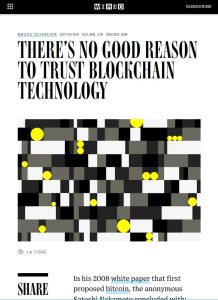
Bruce Schneier
There’s No Good Reason to Trust Blockchain Technology
Wired, 2019
What's inside?
Bitcoin users expose themselves to new risks by placing their trust in technology as opposed to people and institutions.
Recommendation
Are blockchain currencies the future of money or just a temporary hype? Cryptographer and computer security expert Bruce Schneier believes the latter is the case. In fact, he questions the validity of what bitcoin advocates have long seen as the cryptocurrency’s winning asset: that it makes trust superfluous. Investors and technology professionals will find Schneier’s intelligent and well-argued opinion piece thought-provoking.
Take-Aways
- Advocates of bitcoin and blockchain have falsely hailed the system as superior to other payment systems because, they argue, it doesn’t need to rely on trust.
- Yet no constructive human interaction can occur without trust; bitcoin trading is no exception.
- Blockchain relies on users placing blind trust into the system of protocols that governs their transactions, as well as its underlying technology.
- Bitcoin traders are only one hacking operation, computer code bug or forgotten password away from losing all they have.
- Bitcoin traders have no outside recourse to recoup potential losses and remain strongly dependent on a single company that produces most of the mining hardware they use.
Summary
Advocates of bitcoin and the blockchain system that underlies it have hailed the system as superior to other payment systems because, they say, it doesn’t rely on trust. Public blockchains have three distinct features: 1) A public ledger records transactions that every member can review but no one can alter retroactively; 2) a sophisticated consensus algorithm ensures that all decentralized transactions follow the same rules and get recorded in the public ledger; and 3) the system maintains a common currency or digital token, to which members assign value and trade.
“Society can’t function without trust, and the fact that we mostly don’t even think about it is a measure of how well trust works.”
Trust is the foundation of all constructive human relationships. Modern societies have developed several overlapping systems of trust that underlie human interaction. Morals and reputation work well in smaller communities, while rules-based institutions and enforceable laws ensure norms in larger society. Finally, security systems – including locks, alarms and audit systems – provide additional reassurance against potential violators of the laws and norms.
“What blockchain does is shift some of the trust in people and institutions to trust in technology.”
Blockchain enthusiasts celebrate the fact that their system does away with the need to rely on other people, intermediaries or institutions to ensure orderly, rules-based transactions. But blockchain couldn’t function if bitcoin miners didn’t trust in the system of protocols that governs their transactions, as well as the underlying technology that enables them. In fact, trust in the technology must be absolute as bitcoin traders have no outside recourse to recoup their losses if something goes wrong. Bitcoin traders are only one hacking operation, computer code bug or forgotten password away from losing their savings.
“A false trust in blockchain can itself be a security risk.”
Even the most sophisticated system can’t do away with people stepping in from time to time to provide outside governance or adjust the system’s internal rules to changing circumstances. Moreover, bitcoin users shouldn’t base their trust in the system on its decentralized nature. In fact, a single company currently produces most of the mining hardware, and most bitcoin traders continue to rely heavily on a handful of exchanges to make their transactions. A “false trust” in the system can pose a security risk in and of itself. Hence, people are well-advised to stay away from cryptocurrencies.
About the Author
Bruce Schneier is a fellow at the Berkman Center for Internet & Society at Harvard Law School and a program fellow at the New America Foundation’s Open Technology Institute.
This document is restricted to personal use only.
My Highlights
Did you like this summary?
Read the articleThis summary has been shared with you by getAbstract.
We find, rate and summarize relevant knowledge to help people make better decisions in business and in their private lives.
Already a customer? Log in here.


















Comment on this summary